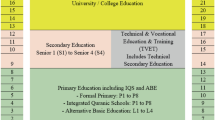Abstract
This study evaluates the effectiveness of different predictive models in the educational sector, focusing on their ability to classify and predict student performance in Portuguese and Mathematics. Several datasets of data from a middle school was used for this study. A set of machine learning techniques was applied to predict Portuguese and Math grades respectively. Among the models analysed, the SVM model proved to be superior, achieving accuracy rates of 93% in Portuguese and 79% in Mathematics, surpassing other methods such as XGBoost, AdaBoost, Gradient Boost and Random Forest. The research also explores the impact of student characteristics on academic outcomes, using advanced techniques such as SHAP and permutation feature importance. Critical factors identified include parental education level, tutoring frequency and individual characteristics, which show complex correlations with student grades. These findings highlight the potential of machine learning to provide actionable insights that can improve educational strategies and student support, thereby improving educational outcomes and engagement. Future research will aim to expand the dataset to further validate and refine these findings.
Access this chapter
Tax calculation will be finalised at checkout
Purchases are for personal use only
Similar content being viewed by others
References
Agarwal, N., Srivastava, R., Srivastava, P., Sandhu, J., Singh, P.P.: Multiclass classification of different glass types using random forest classifier. In: 2022 6th International Conference on Intelligent Computing and Control Systems (ICICCS), pp. 1682–1689. IEEE (2022)
Al-Sudani, S., Palaniappan, R.: Predicting students’ final degree classification using an extended profile. Educ. Inf. Technol. 24, 2357–2369 (2019)
Asselman, A., Khaldi, M., Aammou, S.: Enhancing the prediction of student performance based on the machine learning xgboost algorithm. Interact. Learn. Environ. 31(6), 3360–3379 (2023)
Begum, S., Padmannavar, S.S.: Genetically optimized ensemble classifiers for multiclass student performance prediction. Int. J. Intell. Eng. Syst 15(2), 316–328 (2022)
Casanova, J.R., et al.: Factors that determine the persistence and dropout of university students. Psicothema 30 (2018)
Durães, D.A.: Gaming and robotics to transforming learning. In: Mascio, T.D., Gennari, R., Vittorini, P., De la Prieta, F. (eds.) Methodologies and Intelligent Systems for Technology Enhanced Learning. AISC, vol. 374, pp. 51–56. Springer, Cham (2015). https://doi.org/10.1007/978-3-319-19632-9_7
Henninger, M., Strobl, C.: Local interpretation techniques for machine learning methods: theoretical background, pitfalls and interpretation of lime and shapley values. PsyArXiv. November 14 (2023)
Joseph, A., Bisallah, H.I., Israel, M.: Predicting personnel appointment in the Nigerian army using performance records and machine learning techniques
Lacerda, B., Marcondes, F.S., Lima, H., Durães, D., Novais, P.: Prediction of students’ grades based on non-academic data. In: Milrad, M., et al. (eds.) Methodologies and Intelligent Systems for Technology Enhanced Learning, 13th International Conference, pp. 87–95. Springer, Cham (2023). https://doi.org/10.1007/978-3-031-41226-4_9
Martínez, I., Veiga, F.H.: Engagement de los alumnos en la escuela: Perspectivas sociales y psicológicas (2023)
Romero, C., Ventura, S.: Educational data mining and learning analytics: an updated survey. Wiley Interdiscip. Rev.: Data Mining Knowl. Discov. 10(3), e1355 (2020)
Acknowledgements
This work has been supported by FCT - Fundação para a Ciência e Tecnologia within the R&D Units Project Scope: UIDB/00319/2020.
Author information
Authors and Affiliations
Corresponding author
Editor information
Editors and Affiliations
Rights and permissions
Copyright information
© 2025 The Author(s), under exclusive license to Springer Nature Switzerland AG
About this paper
Cite this paper
Durães, D., Lacerda, B., Bezerra, R., Novais, P. (2025). Predictive Analytics in Education: A Comparative Analysis of Machine Learning Models for Predicting Student Performance. In: Santos, M.F., Machado, J., Novais, P., Cortez, P., Moreira, P.M. (eds) Progress in Artificial Intelligence. EPIA 2024. Lecture Notes in Computer Science(), vol 14967. Springer, Cham. https://doi.org/10.1007/978-3-031-73497-7_12
Download citation
DOI: https://doi.org/10.1007/978-3-031-73497-7_12
Published:
Publisher Name: Springer, Cham
Print ISBN: 978-3-031-73496-0
Online ISBN: 978-3-031-73497-7
eBook Packages: Computer ScienceComputer Science (R0)




